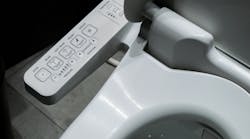Latest from Best Practices
Sponsored
All industries benefit from using the latest technology to improve their operations, deliver new products to consumers, and stay on top of emerging trends. Generally speaking, the average consumer is becoming more tech-savvy, considering all of the benefits new tech offers.
Residential homeowners are also increasingly interested in equipping their homes with updated technologies, and plumbing tech is no exception. Consider how homeowners can automate pretty much everything within their homes—from home security systems to automated kitchen appliances. It seems as though the possibilities are endless.
Plumbers must stay up to date on the newest innovations in the industry. New plumbing technologies, once installed, can save homeowners time and money. At the same time, plumbers can grow their business, expand into new markets, and satisfy their customers by offering the latest products and services.
Below are some examples of the most in-demand plumbing technologies many homeowners want to integrate into their homes.
1. Tankless Water Heaters
The primary benefit of tankless water heaters is that they heat water without requiring a storage tank. According to the U.S. Department of Energy (DOE), most tankless water heaters provide hot water at a rate of 2-5 gallons per minute. Homeowners can benefit from having a constant, endless hot water supply for convenience and comfort.
Additionally, tankless water heaters are more energy-efficient than traditional hot water tanks. They also last longer, have low operating costs, and feature easily replaceable parts. Some popular tankless water heater brands include Ecosmart, Rinnai, and Rheem.
2. Smart Irrigation Systems
With smart irrigation systems, homeowners gain more control over their water usage, especially regarding their home’s sprinkler system. Smart irrigation systems are typically connected to the internet and controlled by a digital device. Usually, a panel on a wall is connected to a smartphone application for easy user access.
People crave the convenience of using an app to set timers, determine what gets watered and when, and even let their system adjust automatically to changes set forth by the National Weather Service. This can help homeowners conserve water—benefiting the environment and lowering their monthly water bill.
3. Smart Toilets
More toilet manufacturers are including smart features in many of their products. Common smart toilet features include automatic flushing, self-deodorizer, heated seating, slow-closing lids, and overflow protection, to name a few. Every smart toilet will vary in the features it provides.
There are a few reasons why consumers desire smart toilets, such as comfort, convenience, increased hygiene, and water conservation. One Duke University professor is developing a smart toilet that can analyze waste using sensors and artificial intelligence (AI).
4. Smart Showers
Another new plumbing technology becoming popular among homeowners is a smart shower. Smart showers offer luxury and convenience for homeowners and their guests. (Keep in mind, there’s a difference between smart shower systems and smart showerheads.)
Like U by Moen, some shower systems start at over $1,000, whereas smart showerheads are typically more affordable and can be installed DIY-style. Some showerheads or systems are voice-activated and some come with water and steam features for ultimate comfort. Most devices can monitor water consumption, which can also be helpful for homeowners looking to reduce their water usage.
5. Touchless Faucets
In the wake of the COVID-19 pandemic, the importance of handwashing was spotlighted, which may be a contributing factor to why touchless faucets are growing in popularity. Many businesses have adopted touchless faucets and are slowly carving out a place in residential settings.
Touchless faucets turn on when they detect motion and deliver precise amounts of water when needed. Forbes published some information on touchless taps and how the market is growing based on remarks from executives at Moen, Delta, and Kohler.
6. Leak Detectors
Homeowners are concerned about the negative impacts of a pipe leaking or breaking. It’s no secret that a leaking pipe can cause severe physical damage or flooding in a home. A viable solution for preventing or addressing leaks is leak detection systems. Over time, the cost of even a small leak can be expensive, so homeowners want to avoid dealing with a leak in the first place.
Common brands associated with leak detection systems are Samsung Smartthings, Nest, and LeakSmart. Many designs are compatible with smartphone apps, which can notify homeowners of a burst water pipe or dripping toilet, even if they are away from their home. Some smart pipe technologies monitor temperature and humidity, water usage and flow, and will even shut off a water supply if an emergency occurs.
7. Greywater Systems
Because homeowners are making an effort to be environmentally- and budget-friendly, greywater systems are increasing in popularity. In some regions, droughts are a concern, so water conservation is necessary. Greywater systems take water that has been gently used and divert it into an irrigation system or recycling system.
Water used to wash dishes, or water from showers or washing machines, can be reused to flush toilets, irrigate plants, or wash clothes. It’s crucial for greywater systems not to use water that has come into contact with waste. Greywater systems filter or treat this gently used water and can reduce a water bill by 50%.
8. Hot Water Recirculation
Depending on the size of a home, it may take several minutes for hot water to reach other house areas, such as bathrooms or kitchens. Additionally, traditional water heating systems may use more water, so some homeowners trying to reduce their water usage have turned to a hot water recirculating system.
Plumbers can install recirculating systems with tankless and storage tank water heaters in homes. Hot water is constantly circulating through the pipes so that homeowners can access it on demand for ultimate convenience. Hot water recirculation systems typically save significant amounts of water, which helps the environment and doesn’t break the bank.
9. Wi-Fi-Enabled Water Filtration Systems
Water quality and taste are important factors in owning a home. Some people will use Brita water filters for drinking or cooking, while others will install water filtration systems. One popular water filtration system, the GE Smart Whole House Water Filtration System, is easy to install and comes with push-to-connect fittings.
This system includes water flow alerts, lead removal, and remote shutoff with any connected smart devices. The filters for this system come in three performance levels: FTHTM, FTHPM, and FTHLM.
All nine of these plumbing technologies will help homeowners gain more control over their water systems and help them be more environmentally friendly. These products will likely increase in demand, so those in the plumbing industry should be aware of them.
Offer the Latest Tech
The plumbing industry has had its fair share of trends come and go in recent years. A few things that remain certain are meeting customer expectations and demands, providing exceptional customer service, and using industry advances to fuel opportunities and business growth.
Consider the technologies mentioned above and see if it’s possible to offer them to customers, as they’re high in demand and can help your business flourish.
Rose Morrison is a freelance writer who covers construction, home improvement, and contracting topics. She is also the managing editor of Renovated.com, a site dedicated to the latest trends in the home industry. She has a passion for innovative technologies that are making the home industry sustainable and efficient. Check out Renovated.com to see more of her work.

Rose Morrison
Rose Morrison is a freelance writer who covers construction, home improvement, and contracting topics. She is also the managing editor of Renovated.com, a site dedicated to the latest trends in the home industry. She has a passion for innovative technologies that are making the home industry sustainable and efficient. Check out Renovated.com to see more of her work.


